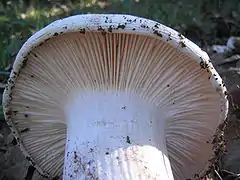Leucopaxillus
Leucopaxillus is a genus of fairly large white-spored gilled mushrooms which are found worldwide growing on the ground in woodlands. These are saprotrophs, but may sometimes be ectomycorrhizal. Less than ten species of Leucopaxillus are known to grow in North America. No species of Leucopaxillus are known to be poisonous, but they do not have an appealing taste or texture. The widespread genus contains about 15 species.[1]
| Leucopaxillus | |
|---|---|
 | |
| Leucopaxillus albissimus | |
| Scientific classification | |
| Kingdom: | |
| Division: | |
| Class: | |
| Order: | |
| Family: | |
| Genus: | Leucopaxillus Boursier |
| Type species | |
| Leucopaxillus paradoxus (Costantin & L.M.Dufour) Boursier | |
| Species | |
|
~15, see text | |
Members of Leucopaxillus are medium-sized to large, have a dry convex to depressed cap, an inrolled margin when young, lack a partial veil and have tough flesh. They have white or yellowish gills which can come off in a layer, leaving the underside of the cap smooth. The spores are white, amyloid and spiny. These mushrooms often smell bad and can be mistaken for Tricholoma and Clitocybe, but mushrooms in those genera are more fragile and rot more quickly. Members of Leucopaxillus have antibiotics which make the mushrooms persist much longer than most, making them appear to be more common than they actually are.
Selected species
- Leucopaxillus albissimus
- Leucopaxillus gentianeus
- Leucopaxillus giganteus
- Leucopaxillus gracillimus
- Leucopaxillus lepistoides
- Leucopaxillus paradoxus
- Leucopaxillus subzonalis
- Leucopaxillus compactus
See also
References
- Kirk PM, Cannon PF, Minter DW, Stalpers JA (2008). Dictionary of the Fungi (10th ed.). Wallingford, UK: CABI. p. 375. ISBN 978-0-85199-826-8.
External links
Further reading
- Singer R, Smith AH. (1943). A monograph on the genus Leucopaxillus Boursier. Papers of the Michigan Academy of Science 28: 85–132.
- Singer R, Smith AH. (1947). Additional notes on the genus Leucopaxillus. Mycologia 39: 725–736.